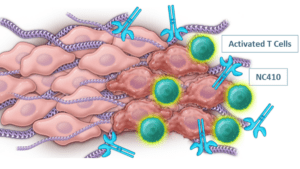
In Conversation with Anne Le, M.D, H.D.R., Founder and CEO of Gigantest
By Sarah Ellinwood
January 23, 2023
If DNA defines who you are, metabolism determines how you’re doing at any point in time.
Metabolism varies from person to person – if you or I were to eat the exact same cookie, our bodies would process that cookie in different ways. You might process it into the fuel for energy, while I process it into fats that go straight to my waistline.
Metabolomics is, as the name suggests, the large-scale study of metabolites (i.e. glucose, cholesterol, etc.) within systems, cells, biofluids, tissues, etc. Understanding metabolism not only gives us insight into how our bodies are functioning, but it helps us understand how we process therapeutics and the effects of drugs on our body.
Dr. Anne Le is a renowned expert in the metabolomics space, having authored multitudes of publications as well as authoring “The Heterogeneity of Cancer Metabolism”, which is now in its second edition.
Serving as a professor at Johns Hopkins for over a decade, Dr. Le recently decided to step out of her comfort zone and start her own company in Baltimore’s Inner Harbor, Gigantest, which provides next-level metabolomics services for scientists and physicians at leading institutions around the world.
Gigantest utilizes cutting-edge technology to push the boundaries of what’s possible with liquid chromatography mass spectrometry (LC-MS/MS) and identify metabolites in everything from blood to sweat to serum and more. In addition to the lab work and data analysis, Gigantest also helps scientists with their metabolomics-related grant applications and publications.
We chatted with Dr. Anne Le to learn more about Gigantest and her motivation to move from professor to entrepreneur.
Talk to us about your career path and what motivated you to start your own business.
I graduated from Paris Descartes University in the Cochin Port-Royal School of Medicine in France. I then came to the United States to do a postdoctoral fellowship at Johns Hopkins University School of Medicine. From there I moved up the ladder, becoming an Assistant Professor at JHU in 2011 and getting tenure in 2017.
I considered myself to be very successful by academic standards – I published high-impact papers and was awarded numerous grants. I was very happy where I was, but my thinking started to change in the midst of the COVID-19 pandemic.
Like many, the pandemic made me realize that life is short, and it pushed me to become more comfortable taking risks. I didn’t feel satisfied with the continuous cycle of publishing and applying for grants – I wanted to have a real-world impact to help people live better lives.
As a result, I decided to step out on faith and take the leap and start my own company, to leverage my skillset for greater effect.
Your credo is “From Lab to Life.” Can you speak more about this?
You’ve probably heard the phrase, “From Bench to Bedside.” It’s a common saying that refers to how a drug goes from being developed in a lab to being delivered to patients.
This has been the motto for drug development for decades, but I wanted to take things a step further.
Why wait until someone is presumably sick on a bed before we treat them? In an ideal world, we should be able to intervene before someone ends up on a bed in the hospital. I want to help people thrive and avoid illness as much as possible.
Think about it – in research we use all kinds of expensive machinery, from microscopes to fancy mass spectrometry machines. If you don’t keep up with preventative maintenance, those machines will break down and put your experiments on hold.
We have these preventative measures in place for expensive machines – why not more for ourselves? When you’re in a hospital your life is on hold. Full metabolic profiles can help in identifying biomarkers for diseases, understanding the mechanisms of disease, studying the effects of environmental factors and more.
Why did you choose to initially start your business in Baltimore?
Leaving my professorship to start my business was a lot like leaving home when you turn 18. I looked at locations all over the country, but ultimately decided to stay in Baltimore because our building is surrounded by many prestigious biotech companies and medical institutions, such as Johns Hopkins Campus, University of Maryland Medical Campus, Institute of Marine and Environmental Technology (IMET), government agencies, and more.
Being located on the I-95 corridor also gives easy access to Baltimore-Washington International Airport, Washington, DC, North Carolina, and New York City, which are prominent biotech hubs. We are well-positioned for fruitful collaborations with local and national organizations.
What’s been your biggest challenge so far, and how have you overcome?
When you’re promoted from a postdoc to a professor the university says, “Here’s your lab! Here’s your bench! Now go and apply for money and publish.”
On the contrary, when you start your own life science business no one says, “Here’s your lab!” You need to find the space and actually build your lab yourself.
Thankfully, that’s why it’s been such a blessing that I have a highly skilled contractor, Mr. Edward Grove who has helped me to build my lab.
In your opinion, what does Baltimore need to do to grow as a biohub?
Baltimore is a great place for me to grow my business and I have tremendous hope that Baltimore leadership will continue to improve business incentives (ex: tax credit and rebates) and the city’s safety.
I’ve shared my thoughts with city leadership to suggest ways by which Baltimore could achieve its full potential as a biohub in the region.
- About the Author
- Latest Posts
Sarah Ellinwood is BioBuzz’s Managing Editor. A scientist by training and a science communicator at heart, Sarah specializes in making complex concepts understandable, engaging, and exciting. She received her Ph.D. in molecular and cellular biology with a focus in infectious disease immunology from the University of Maryland and is passionate about all things related to scicomm, peer mentorship, and women in STEM.








